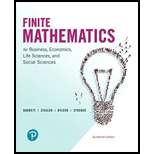
Investment You have inherited
Note: For a one-time play (investment), you would split your investment proportional to the entries in your optimal strategy matrix. Assume that fate is a very clever player. Then if fate deviates from its optimal strategy, you know you will not do any worse than the value of the game, and you may do better.
Want to see the full answer?
Check out a sample textbook solution
Chapter 11 Solutions
Finite Mathematics for Business, Economics, Life Sciences and Social Sciences
Additional Math Textbook Solutions
Basic Business Statistics, Student Value Edition
Elementary Statistics (13th Edition)
Algebra and Trigonometry (6th Edition)
Intro Stats, Books a la Carte Edition (5th Edition)
- Although 330° is a special angle on the unit circle, Amar wanted to determine its coordinates using the sum and difference formulas.Part A: Determine cos 330° using the cosine sum identity. Be sure to include all necessary work.Part B: Determine sin 330° using the sine difference identity. Be sure to include all necessary work.arrow_forwardA public health researcher is studying the impacts of nudge marketing techniques on shoppers vegetablesarrow_forward4. Let A {w, e, s, t, f, i, e, l, d, s, t, a, t, e}. (a) How many different words (they do not have to make sense) can you spell with the letters in A? (b) Is your answer from above the same as the cardinality of the powerset of A, i.e. of P(A)? (c) What is |A|?arrow_forward
- what can the answer be pls helparrow_forward5. How many numbers can you make out of the digits 1, 2, 3, 4, 6 if the rule is that every digit has to be larger than the digit preceding it? For example 124 is ok, 122 is not ok. Every digit can be used only once, but you do not have to use every digit. A tree might help.arrow_forward5 plsarrow_forward
- 8 pls show workarrow_forward7 pls show workarrow_forwardThe director of admissions at Kinzua University in Nova Scotia estimated the distribution of student admissions for the fall semester on the basis of past experience. Admissions Probability 1,100 0.5 1,400 0.4 1,300 0.1 Click here for the Excel Data File Required: What is the expected number of admissions for the fall semester? Compute the variance and the standard deviation of the number of admissions. Note: Round your standard deviation to 2 decimal places.arrow_forward
 Discrete Mathematics and Its Applications ( 8th I...MathISBN:9781259676512Author:Kenneth H RosenPublisher:McGraw-Hill Education
Discrete Mathematics and Its Applications ( 8th I...MathISBN:9781259676512Author:Kenneth H RosenPublisher:McGraw-Hill Education Mathematics for Elementary Teachers with Activiti...MathISBN:9780134392790Author:Beckmann, SybillaPublisher:PEARSON
Mathematics for Elementary Teachers with Activiti...MathISBN:9780134392790Author:Beckmann, SybillaPublisher:PEARSON
 Thinking Mathematically (7th Edition)MathISBN:9780134683713Author:Robert F. BlitzerPublisher:PEARSON
Thinking Mathematically (7th Edition)MathISBN:9780134683713Author:Robert F. BlitzerPublisher:PEARSON Discrete Mathematics With ApplicationsMathISBN:9781337694193Author:EPP, Susanna S.Publisher:Cengage Learning,
Discrete Mathematics With ApplicationsMathISBN:9781337694193Author:EPP, Susanna S.Publisher:Cengage Learning, Pathways To Math Literacy (looseleaf)MathISBN:9781259985607Author:David Sobecki Professor, Brian A. MercerPublisher:McGraw-Hill Education
Pathways To Math Literacy (looseleaf)MathISBN:9781259985607Author:David Sobecki Professor, Brian A. MercerPublisher:McGraw-Hill Education





